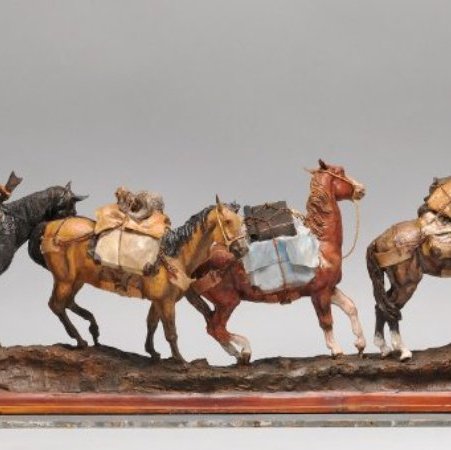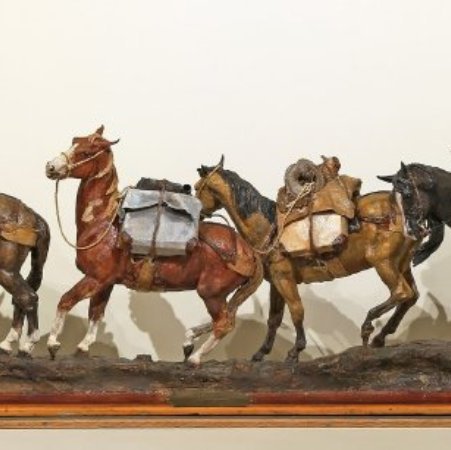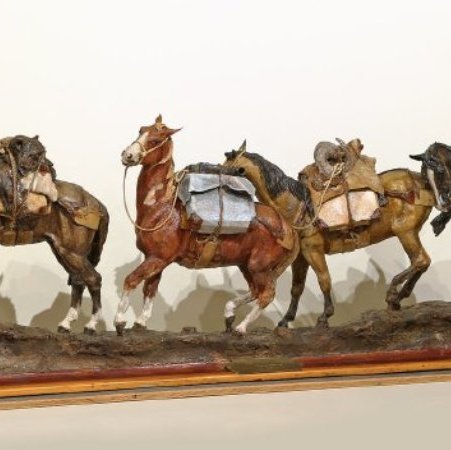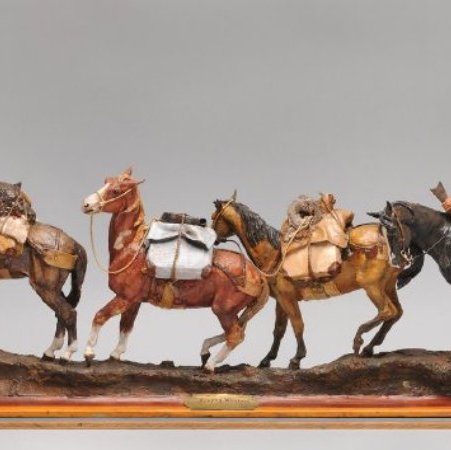Title:
TROPHY HUNTERS
Artist:
Heikka, Earl E. (1910-1941)
Medium:
Taxidermist Clay/Paint/Twine
Date:
1930
Source:
In memory of Mr. and Mrs. Carlos Ryan
Object ID:
X1974.15.01
Description:
People from all over the world came to prize the challenge of hunting in Montana's wild landscape. Others bought trophies and hides from market hunters, which contributed to the decimation of animal populations.
"The wilderness hunter must not only show skill in the use of the rifle and address in finding and approaching game, but he mush also show the qualities of hardihood, self-reliance, and resolution needed for effectively grappling iwth his wild surroundings." -Theodore Roosevelt, 1893
Historically, Montanans often hunted out of necessity, but the pursuit of wild game has always been a popular form of recreation as well. In this hand-painted clay model, titled Trophy Hunters, Great Falls artist E. E. Heikka (1910-1941) provides a vivid glimpse of a successful back-country hunting trip. The four pack horses are loaded with a bear head and skin, a bighorn ram's head, moose antlers, and the hunters' requisite gear. The actions of the two men-the lead rider points while his companion pulls his rifle from its scabbard-indicates that the hunt may not be over. The details that Heikka so expertly captured in his sculptures like Trophy Hunters came from careful, firsthand observation. As a teenager Heikka worked for well-known Augusta outfitter Emil Klick, who recalled that the young artist "noticed things about the animals, how they looked and how they were packed-things most kids his age would never pay any attention to, and few older folks would either."
"The wilderness hunter must not only show skill in the use of the rifle and address in finding and approaching game, but he mush also show the qualities of hardihood, self-reliance, and resolution needed for effectively grappling iwth his wild surroundings." -Theodore Roosevelt, 1893
Historically, Montanans often hunted out of necessity, but the pursuit of wild game has always been a popular form of recreation as well. In this hand-painted clay model, titled Trophy Hunters, Great Falls artist E. E. Heikka (1910-1941) provides a vivid glimpse of a successful back-country hunting trip. The four pack horses are loaded with a bear head and skin, a bighorn ram's head, moose antlers, and the hunters' requisite gear. The actions of the two men-the lead rider points while his companion pulls his rifle from its scabbard-indicates that the hunt may not be over. The details that Heikka so expertly captured in his sculptures like Trophy Hunters came from careful, firsthand observation. As a teenager Heikka worked for well-known Augusta outfitter Emil Klick, who recalled that the young artist "noticed things about the animals, how they looked and how they were packed-things most kids his age would never pay any attention to, and few older folks would either."
 Virtual Exhibits
Virtual Exhibits





